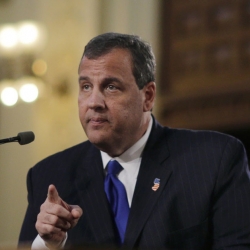
Chris Christie warned about integrity fees and handing decision making over sportsbook licensing over to federal bureaucrats.
Former New Jersey Gov. Chris Christie warned lawmakers across the United States to resist a bill which would give the US federal government control over regulating sports betting. The Republican politicians gave his opinion in a speech on Friday at a legislative conference.
In his speech, Gov. Christie referred to a bill submitted to the US Senate by Sen. Charles Schumer (D-New York) and retired Sen. Orrin Hatch (R-Utah) last month. The bill calls for the US Justice Department to control sportsbook licensing decisions.
Currently, individual US states have the right to pass regulations and authorize state agencies to license sports betting operators. Most US states give that authority to state gaming commissions, though some have discussed handing over licensing to lottery commissions or racing commissions.
The Schumer-Hatch bill would allow states to write their own gaming laws, but allow lawyers in the Justice Department to make licensing decisions instead of state commissioners. Any such bill likely would have other controversial clauses which Christie warns could undermine states rights and state-level officials’ authority.
Integrity Fees Challenged
Chris Christie said “integrity fees” likely would be in any federal legislation. An integrity fee would be a tax charged to sportsbooks on 0.25% to 1.00% of their sports betting turnover to compensate sports leagues for the cost of policing their sport.
Gov. Christie said lawmakers allowing the federal government and sports leagues to impose integrity fees would simply “reward bad behavior”.
Speaking to a room full of state lawmakers and gaming executives, Christie said, “We’re going to reward the people who fought us for seven years with fees that are going to diminish your margins? They don’t need it, and given their conduct over the last seven years, they don’t deserve it.”
What Is an Integrity Fee?
The integrity fee was suggested by a sports writer and seized upon by NBA Commissioner Adam Silver. Since then, MLB Commissioner Rob Manfred and NFL Commissioner Roger Goodell have backed the idea of integrity fees.
Lawmakers like former State Sen. Ray Lesniak of New Jersey have pushed back on the concept of integrity fees. Lesniak said, after the leagues spent 6 years trying to destroy New Jersey sports betting, bookmakers and state governments should not pay one dime of “tribute” to the NFL, NBA, and MLB.
Others point out that the leagues have claimed to be doing everything to protect their sports’ integrity for the past 25 years, so maintaining that same level of integrity should not cost them a bit more.
Chris Christie on State Regulated Sportsbooks
Despite attempts to limit sports betting, Christie said the PASPA era proved that state governments had the ability to regulate sports betting. No major match-fixing or point-shaving scandals have rocked US sports since 1993, when PASPA went into effect.
Christie said, “We do not need a federal solution to this problem. States have been regulating gambling for decades without incident.”
Chris Christie on Sports Betting
It was Chris Christie who backed New Jersey’s challenge to the 25-year old federal ban on sports betting in 46 states, the Professional and Amateur Sports Protection Act. PASPA was passed by the US Congress at the behest of the NFL, NBA, and MLB based on the idea that sports betting undermined the integrity of pro sports.
When New Jersey passed a sports betting bill in 2012, the leagues sued to enforce PASPA. The lawsuit led to five legal defeats by New Jersey, a repeal of its sports betting regulations and another lawsuit in 2014. The second suit ended up before the US Supreme Court in December 2017.
Murphy v. NCAA
The case originally was called Christie v. NCAA, but its name was changed to Murphy v. NCAA because Christie’s successor was governor at the time of the ruling. Because the PASPA allowed four states to have sports betting while banning 4 others, the Supreme Court ruled the ban was unconstitutional due to the Commerce Clause. The commandeering principle and equal sovereignty (between the state and federal governments) also were key in the decision.
The PASPA ruling before the Supreme Court is a key part of Chris Christie’s legacy as New Jersey governor. New Jersey had over $1 billion in turnover on sports betting in less than 7 months of operation in 2018, so legal sportsbooks could generate at least $200 million in tax revenues per year for New Jersey moving forward.
